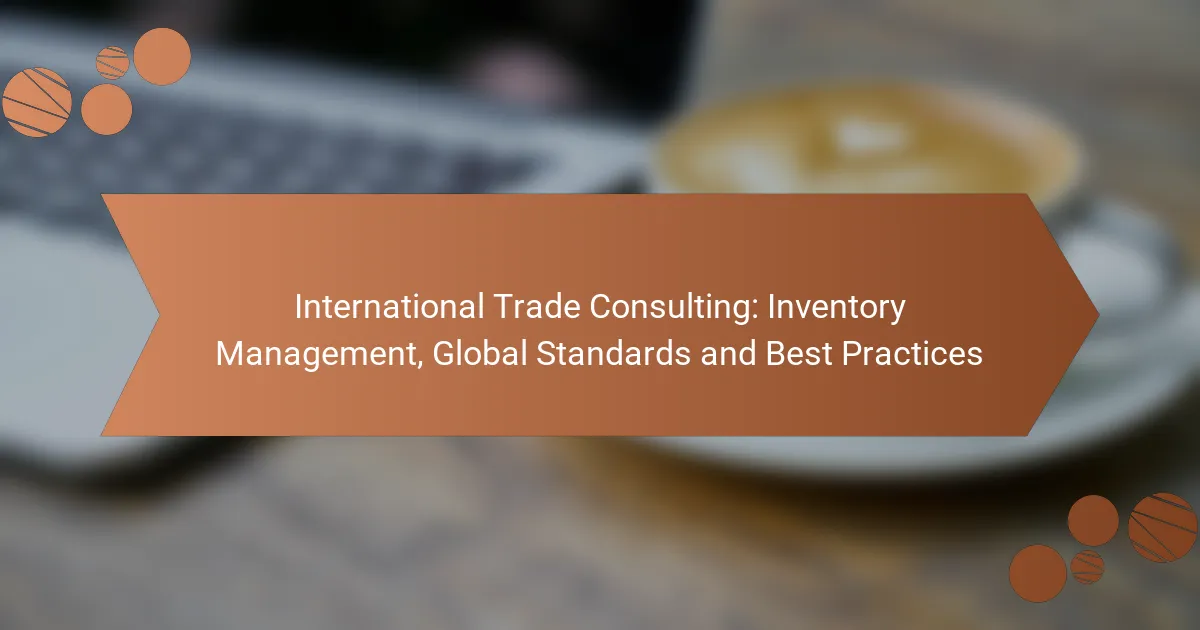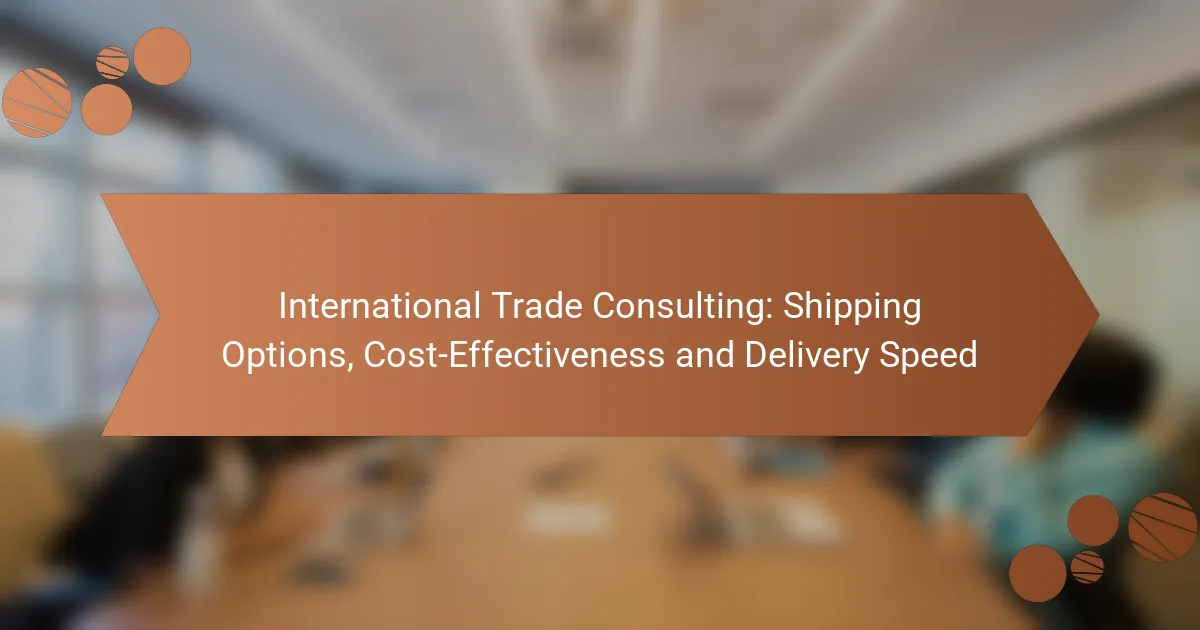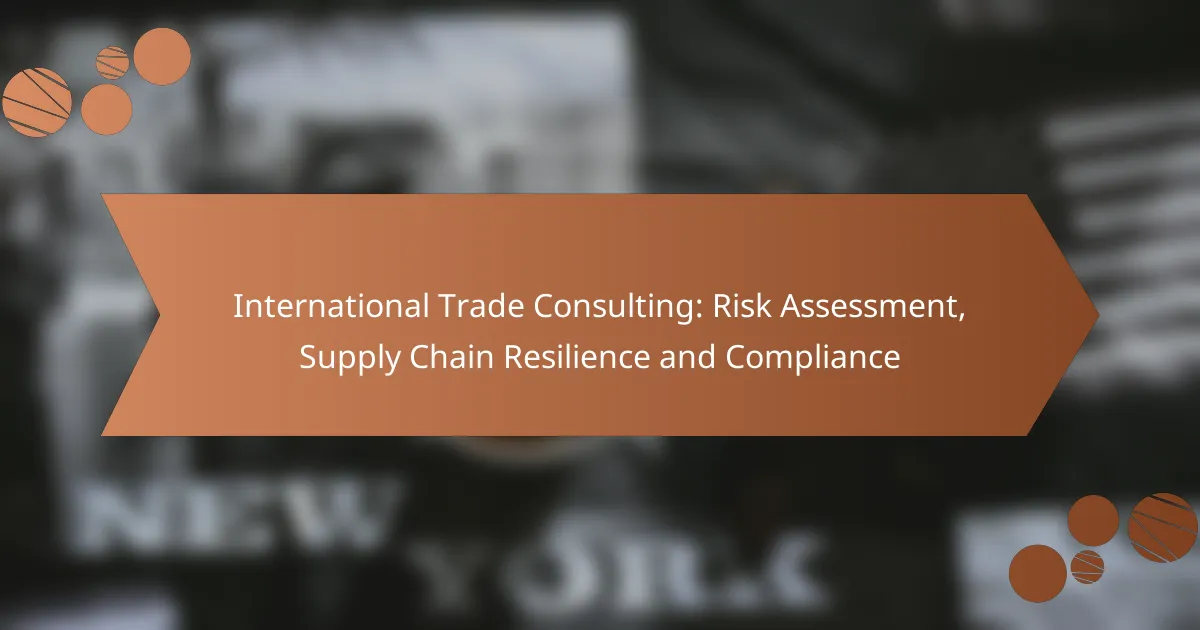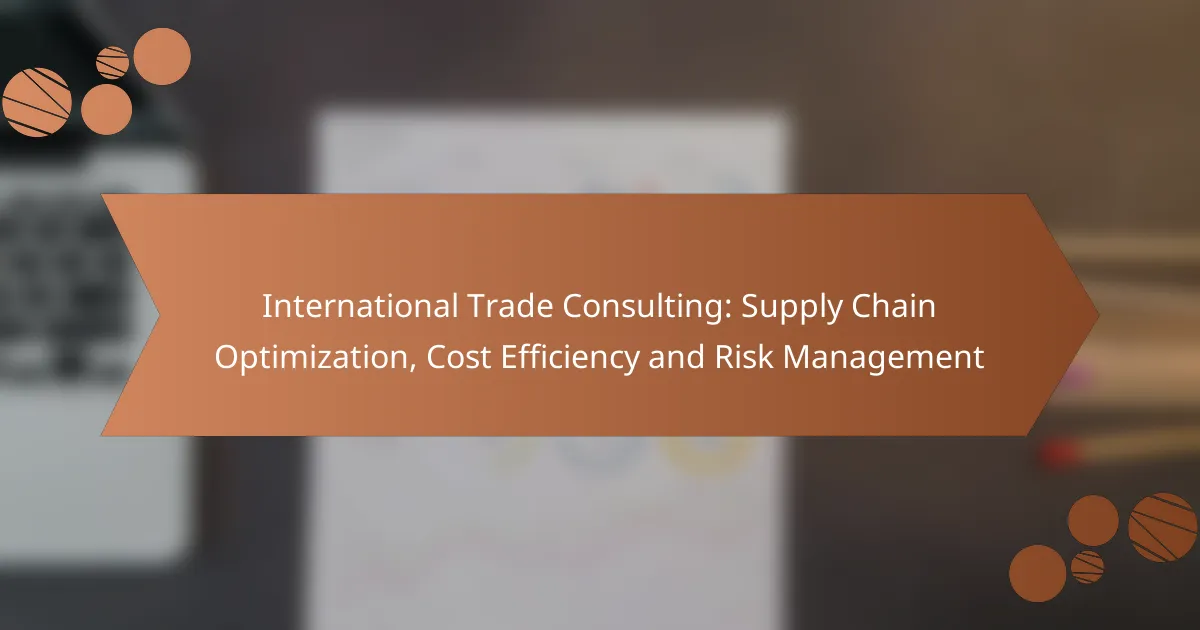International trade consulting plays a vital role in enhancing inventory management by streamlining processes and aligning practices with global standards. By adopting best practices, businesses can optimize stock levels, reduce costs, and ensure compliance with key regulations, ultimately leading to more efficient and competitive operations in the global marketplace.
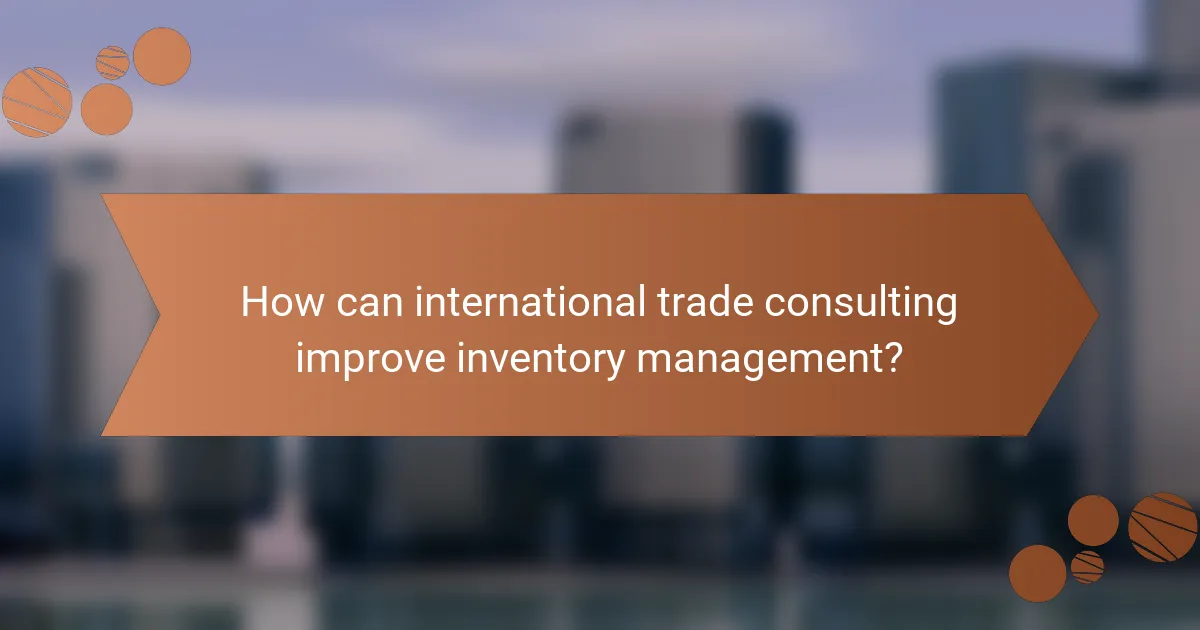
How can international trade consulting improve inventory management?
International trade consulting enhances inventory management by optimizing processes, improving accuracy, and reducing costs. By leveraging expert insights, businesses can align their inventory practices with global standards and best practices, leading to more efficient operations.
Enhanced forecasting techniques
Enhanced forecasting techniques involve using advanced analytics and market data to predict inventory needs more accurately. By analyzing historical sales data and market trends, companies can better anticipate demand fluctuations, which helps in maintaining optimal stock levels.
For example, businesses can implement statistical models that consider seasonal variations and economic indicators, allowing them to adjust inventory proactively. This approach minimizes excess stock and reduces the risk of stockouts, ultimately improving customer satisfaction.
Streamlined supply chain processes
Streamlined supply chain processes focus on eliminating inefficiencies and improving coordination among suppliers, manufacturers, and distributors. By adopting best practices such as just-in-time (JIT) inventory, companies can reduce lead times and lower holding costs.
Implementing standardized procedures and clear communication channels across the supply chain ensures that all parties are aligned. This can lead to faster response times and a more agile inventory management system, which is crucial in the dynamic landscape of international trade.
Real-time inventory tracking systems
Real-time inventory tracking systems provide businesses with up-to-the-minute visibility of their stock levels across various locations. Utilizing technologies like RFID and IoT devices, companies can monitor inventory movements and reduce discrepancies.
This capability allows for immediate adjustments to inventory levels based on actual sales and stock availability. As a result, businesses can make informed decisions quickly, reducing the likelihood of overstocking or understocking situations.
Integration of ERP solutions
Integrating Enterprise Resource Planning (ERP) solutions enhances inventory management by centralizing data and automating processes. An ERP system can synchronize inventory data with other business functions, such as sales and finance, providing a holistic view of operations.
When selecting an ERP solution, businesses should consider scalability and compatibility with existing systems. A well-integrated ERP can streamline order processing and inventory replenishment, ultimately leading to improved efficiency and reduced operational costs.

What global standards should be considered in international trade?
In international trade, adhering to global standards is crucial for ensuring compliance, efficiency, and competitiveness. Key standards include ISO guidelines, WTO regulations, and customs compliance requirements, all of which help streamline operations and mitigate risks.
ISO standards for logistics
ISO standards for logistics provide a framework for best practices in supply chain management, ensuring quality and efficiency. These standards cover various aspects such as inventory management, transportation, and warehousing, which help organizations optimize their operations.
For instance, ISO 9001 focuses on quality management systems, while ISO 28000 addresses security in the supply chain. Implementing these standards can lead to improved customer satisfaction and reduced operational costs.
WTO regulations on trade practices
The World Trade Organization (WTO) establishes regulations that govern international trade practices, promoting fair competition and reducing trade barriers. These regulations help countries navigate tariffs, import quotas, and trade agreements effectively.
Businesses should familiarize themselves with the General Agreement on Tariffs and Trade (GATT) and the Trade Facilitation Agreement (TFA), which aim to simplify customs procedures and enhance transparency. Compliance with these regulations can prevent costly disputes and enhance market access.
Customs compliance requirements
Customs compliance requirements are essential for ensuring that goods cross borders without legal issues. This includes accurate documentation, proper classification of goods, and adherence to import/export regulations specific to each country.
Companies should maintain up-to-date knowledge of local customs laws and tariffs, as these can vary significantly by region. Utilizing customs brokers can help navigate complex regulations and avoid penalties associated with non-compliance.

What are the best practices for inventory management in e-commerce?
Effective inventory management in e-commerce focuses on optimizing stock levels, reducing costs, and ensuring product availability. Best practices include implementing just-in-time systems, utilizing automated tools, and conducting regular audits to maintain accuracy and efficiency.
Just-in-time inventory systems
Just-in-time (JIT) inventory systems aim to align inventory levels closely with demand, minimizing holding costs. This approach requires accurate demand forecasting and strong supplier relationships to ensure timely deliveries. For e-commerce businesses, JIT can help reduce excess stock and improve cash flow.
However, JIT systems can be risky, especially during supply chain disruptions. Businesses should have contingency plans in place, such as alternative suppliers or safety stock, to mitigate potential shortages.
Automated inventory management tools
Automated inventory management tools streamline tracking and managing stock levels, reducing human error and saving time. These tools often integrate with e-commerce platforms, providing real-time data on inventory status and sales trends. Popular options include software like TradeGecko and Zoho Inventory.
When selecting an automated tool, consider features such as barcode scanning, reporting capabilities, and integration with other systems. Investing in the right technology can significantly enhance operational efficiency and improve decision-making.
Regular inventory audits
Conducting regular inventory audits is essential for maintaining accuracy and identifying discrepancies. Audits can be performed annually, quarterly, or even monthly, depending on the size of the business and inventory turnover rates. Physical counts and cycle counting are common methods used to verify stock levels.
Establish a clear schedule for audits and ensure that staff are trained to follow procedures accurately. Regular audits help prevent stockouts and overstock situations, ultimately leading to better customer satisfaction and improved profitability.

How to select the right international trade consultant?
Selecting the right international trade consultant involves assessing their expertise, industry experience, and proven track record. Focus on consultants who demonstrate a strong understanding of your specific needs and can navigate the complexities of global trade effectively.
Experience in specific industries
When choosing a consultant, prioritize those with experience in your industry. Different sectors, such as manufacturing, agriculture, or technology, have unique challenges and regulations that require tailored strategies.
For example, a consultant with a background in the automotive industry will be familiar with compliance standards and supply chain dynamics specific to that sector. This specialized knowledge can lead to more effective solutions and smoother operations.
Client testimonials and case studies
Reviewing client testimonials and case studies can provide insight into a consultant’s effectiveness. Look for feedback that highlights successful projects, particularly those that align with your business goals.
Case studies showcasing measurable outcomes, such as cost reductions or improved delivery times, can illustrate a consultant’s ability to deliver results. Consider reaching out to past clients for firsthand accounts of their experiences.
Expertise in global logistics
A strong understanding of global logistics is crucial for any international trade consultant. They should be well-versed in shipping regulations, customs procedures, and supply chain management to ensure smooth operations across borders.
Evaluate their knowledge of logistics software and tools that can optimize shipping routes and reduce costs. A consultant with a robust logistics strategy can help you navigate potential pitfalls and enhance your overall efficiency in international trade.
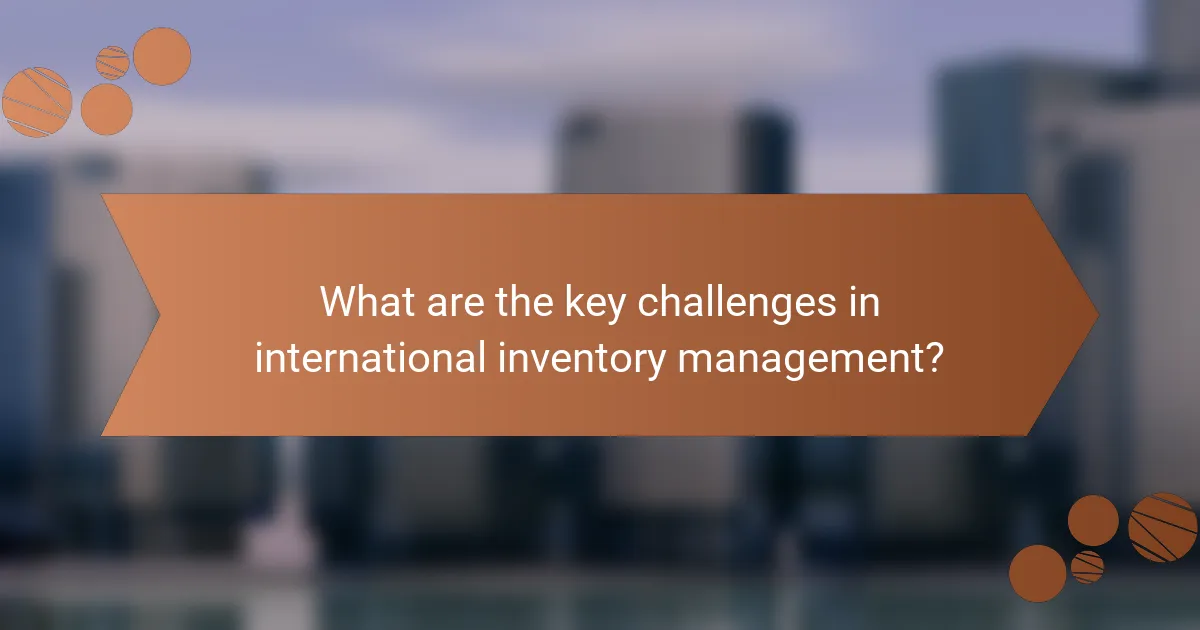
What are the key challenges in international inventory management?
International inventory management faces several key challenges that can significantly impact efficiency and profitability. These challenges include regulatory compliance issues, currency fluctuations, and supply chain disruptions, each requiring careful navigation to ensure smooth operations.
Regulatory compliance issues
Regulatory compliance is a major challenge in international inventory management, as businesses must adhere to varying laws and standards across different countries. This includes customs regulations, import/export restrictions, and safety standards that can differ widely.
To manage compliance effectively, companies should stay updated on the regulations specific to each market they operate in. Regular audits and consultations with legal experts can help mitigate risks associated with non-compliance, which can lead to fines or shipment delays.
Currency fluctuations
Currency fluctuations can create unpredictability in international inventory management, affecting pricing and profit margins. Changes in exchange rates can lead to increased costs for imported goods or reduced revenue from exports.
To minimize the impact of currency volatility, businesses can consider hedging strategies or pricing adjustments. Keeping a close eye on market trends and using financial instruments to lock in exchange rates can provide greater stability in budgeting and forecasting.
Supply chain disruptions
Supply chain disruptions are a significant concern in international inventory management, often caused by geopolitical events, natural disasters, or logistical challenges. These disruptions can lead to delays in product availability and increased costs.
To mitigate these risks, companies should diversify their supplier base and develop contingency plans. Establishing strong relationships with multiple suppliers and maintaining safety stock can help ensure continuity of supply even during unforeseen events.
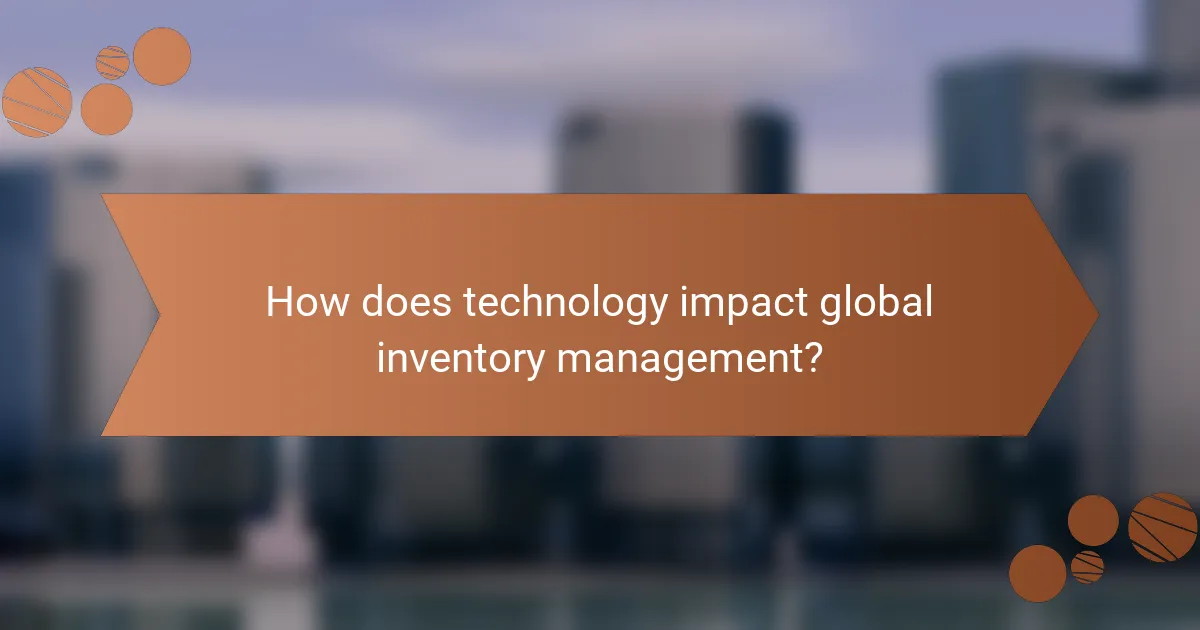
How does technology impact global inventory management?
Technology significantly enhances global inventory management by improving accuracy, efficiency, and responsiveness. Tools like AI and blockchain streamline processes, reduce errors, and provide real-time visibility into inventory levels across various locations.
Use of AI for demand forecasting
AI plays a crucial role in demand forecasting by analyzing historical data and identifying patterns to predict future inventory needs. This technology can adjust forecasts based on real-time sales data, seasonal trends, and market fluctuations, leading to more accurate inventory levels.
Businesses can implement AI-driven tools to automate demand planning, which helps in minimizing stockouts and overstock situations. For instance, retailers can utilize AI to optimize their stock levels during peak shopping seasons, ensuring they meet customer demand without excess inventory costs.
Blockchain for supply chain transparency
Blockchain technology enhances supply chain transparency by providing a secure and immutable ledger of transactions. This allows all parties involved in the supply chain to access real-time data regarding inventory status, shipment tracking, and product authenticity.
By adopting blockchain, companies can improve traceability and accountability, which is essential for compliance with international trade regulations. For example, food and pharmaceutical industries can leverage blockchain to ensure that products are sourced ethically and meet safety standards, thereby building consumer trust.
